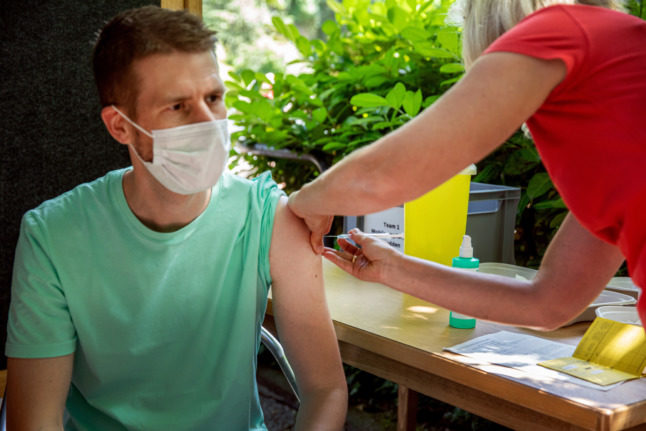What’s happening?
At around 17.5 new weekly cases per 100,000 people, Germany’s incidence of Covid infections is still very much on the low side – but health experts are concerned at the pace at which the numbers are rising.
At a press conference recently, Health Minister Jens Spahn predicted that if the country continued along its current trajectory, the 7-day incidence of cases could soar over the coming months and end up at 800 cases per 100,000 people.
READ ALSO: Fact check: Will Germany’s Covid incidence really reach 800 by October?
On the other side of the coin, the number of people getting vaccinated in Germany is at a relatively high level, and creeping up bit by bit. As of Tuesday, the proportion of people who’d had both jabs was just shy of the 50 percent mark – meaning every one in two residents of the country is technically protected against Covid-19.
In its latest Covid-19 situation report, the Robert Koch Institute (RKI) revealed that small proportion of people who had been vaccinated had also been infected with Covid.
Does that mean that Covid vaccines aren’t working?
Far from it. In fact, experts have taken it as a positive sign that vaccinated people account for such a small percentage of the total number of infections over the past few months.
That said, it’s important to understand that not all vaccines are 100 percent effective, and that different vaccines can have different levels of effectiveness against different Covid variants. This is because some variants, such as Delta, are more infectious than others.
READ ALSO: European health authorities warn of surge in Delta variant infections
In general, inoculated people are between 66 and 95 percent protected against getting an infection in the first place – depending on the type of vaccine and the variant in question. Other factors such as age and existing illnesses can also come into play.
Here’s where it gets more complicated, though, since being infected does not necessarily mean getting severely ill, so if you get infected after being vaccinated, you could well escape with nothing more than a runny nose.
Auch in Italien zeigen die Impfungen eine gute Wirkung gegen Delta. Symptomatische Infektionen werden zu 88%, schwerere Infektionen zu über 95% verhindert. #ImpfenSchuetzt https://t.co/uBbPQtYPeY
— Carsten Watzl (@CarstenWatzl) July 25, 2021
Immunology expert Carsten Watzl points out on Twitter that vaccinations seem to be offering good protection against the Delta variant in Italy.
So how many of the new cases in Germany were fully vaccinated?
Since February 1st, 2021, 1,425,729 new Covid infections have been recorded by the Robert Koch Institute. Of these, 6,125 were so-called “vaccination breakthroughs” (or Impfdurchbrüche, in German), meaning cases in which the individual had received a full course of doses but nonetheless become ill with Covid.
That means that only around 0.45 percent of the new cases in Germany have involved people who are fully vaccinated. The vast majority of people who became ill from Covid were people with no existing immunity, as well as a certain proportion of people who had also recovered from the virus in previous months.
Can vaccinated people still get hopitalised from Covid?
It is possible, but once again, it largely depends on whether the individual is particularly vulnerable to what are known as ‘severe courses’ of Covid.
These high risk groups, such as the elderly or those with a weakened immune system, have a reduced risk of hospitalisation or death from Covid after getting vaccinated. However, in comparison with young and healthy people who have had a vaccine, the chance of getting very ill or being hospitalised is naturally higher.
Going back to the RKI’s stats, just under a third (29 percent) of the people who became ill with Covid after getting vaccinated were hospitalised. Of these, none were under the age of 18, two percent were between 18 and 59 years old, and 27 percent were over the age of 60.
According to science journalist Volkart Wildermuth, if people over the age of 80 have a 10 percent chance of dying from Covid, vaccination can reduce this to one percent. “That’s a big difference,” he told Deutschland Funk on Monday.
READ ALSO: Merkel urges Germans to get vaccinated amid ‘exponential growth’ of Covid infections
In addition, health experts believe that every jab does its bit to protect the populace as a whole. If Germany manages to put shots in the arms of at least 85 percent of its 12-59 year olds, the country could finally attain those two much sought-after words: herd immunity.



 Please whitelist us to continue reading.
Please whitelist us to continue reading.
Stop pcr testing at 45 cycles and reports from the CDC have now stated that lateral flow and antigen tests are providing false positives by a very large percentage.
What is “very large”? Please be more specific if you are going to post a quasi-scientific comment.
Thanks!